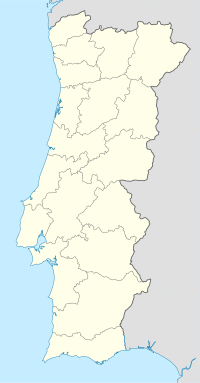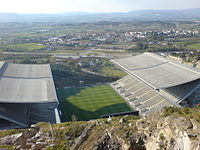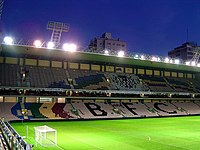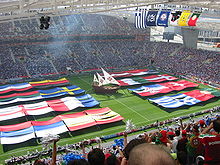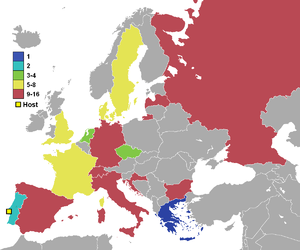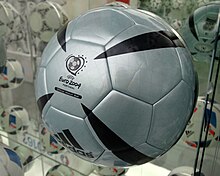Euro 2004
The European Championship 2004 (officially the UEFA European Football Championship 2004 or UEFA Euro 2004) was the twelfth edition of the European men's football championship organized by UEFA. It was held in Portugal from June 12 to July 4, 2004.
The championship included the participation of 16 national teams affiliated to UEFA: Portugal entered automatically as the organizing country, while the remaining fifteen obtained their place through the corresponding qualifying phase. Without notable absences among the great powers, the debut of Latvia in a Eurocup and the return of Greece after twenty-four years of absence stood out.
The Greece team surprised them by becoming European champions for the first time in their history, after beating Portugal 1:0 in the final with a goal from Angelos Charisteas. Despite not starting among the favourites, the defensive game displayed by Otto Rehhagel's team made them worthy of victory. Euro 2004 was also marked by the poor results of teams that started as favourites: Germany, Spain and Italy fell in the group stage, while France, defending champions, were defeated in the quarterfinals by the Hellenic team.
The final between Greece and Portugal was the first of the tournament for both countries, something that had not happened since the inaugural edition, and it was also the first of a Euro or World Cup between the two teams in the opening match.
Choice of venue
The decision took place on October 12, 1999, at a congress of the UEFA Executive Committee held at the Dorint Quellenhoff hotel in Aachen (Germany). In the shortlist of candidacies, Portugal prevailed over Spain and the joint presentation of Austria and Hungary.
The Spanish candidacy started as the favorite to win, since the country already had experience in major sporting events and had almost all the facilities ready. However, the Portuguese Football Federation (FPF) —chaired at that time by Gilberto Madail— sold a project supported by all the institutions to modernize the Portuguese sport, through a budgeted investment of 300 million euros that would go towards improving transport and the construction and renovation of ten soccer fields, including the new Estádio da Luz. The organization also intended to promote the economic development of a country that had already successfully organized the Expo '98 in Lisbon. The godfather of the candidacy was Eusébio, the first Portuguese Ballon d'Or.
The results of the vote were not officially revealed, but it was estimated that Portugal had obtained 10 supports compared to four for Spain and two for the Austro-Hungarian candidacy.
Although Lennart Johansson, UEFA president, had appealed to the principle of solidarity to justify the choice of Portugal, the president of the evaluation commission added that the Portuguese infrastructures were better than the Spanish ones. This comment was highly criticized by the Royal Spanish Football Federation, which came to describe it as "false" and "unpresentable" because it responded "for a project rather than for a reality".
Organization
UEFA accepted that the responsibilities of Euro 2004 would be assumed by two limited companies: «Portugal 2004» for the infrastructures and «Euro 2004» as Organizing Committee. While the first company was controlled by the Portuguese government, the second had the following division: UEFA (55%), the Portuguese Football Federation (40%) and the Portuguese State (5%).
The person in charge of the Organizing Committee was Gilberto Madail, leader of the Portuguese Federation, while the vice-presidency corresponded to Jeu Sprengers, the treasurer of UEFA.
Locations
Euro 2004 had a total of ten venues in eight cities, all of them in mainland Portugal for logistical reasons. The two largest in the country, Lisbon and Porto, contributed two stadiums each. The rest of the venues were in Aveiro, Braga, Coimbra, Faro-Loulé, Guimarães and Leiría.
The construction of the venues was the most important aspect of the organisation, since the bid had proposed seven newly built stadiums and three refurbishments. All the works were carried out in accordance with UEFA infrastructure regulations, therefore that even the facilities already built required extensive works. During the five years following the Eurocup there were delays in the works, especially in the new Porto stadium, which led UEFA to appoint a head of operations, Martin Kallen. However, all the venues were ready with months of in advance. More than 595 million euros were invested in this section, of which 16% was paid for with public funds.
The inauguration took place at the new Estadio do Dragão in Porto, with a capacity for 52,000 people, while the grand final was held at the Estadio da Luz de Lisboa, built on land adjacent to the original 1954 field, in front of more than 64,600 spectators. Da Luz took most of the construction costs, with an estimated cost of 162 million euros.
Among the new fields built, the Municipal Stadium of Braga stood out, designed by Eduardo Souto de Moura, which was awarded the Pritzker Architecture Prize in 2011 for its innovative design: it was built on the slope of a rock quarry, and the only two stands on the sides are connected by steel cables.
Competition format
Euro 2004 takes place in two phases: a group phase and a knockout phase for the title.
In the group stage, the 16 participating teams are divided into four groups with four teams each. Following a system of all against all, each team plays once against the three rivals of its group. At its conclusion, the group champion and runner-up qualify for the next phase, while the third and fourth are eliminated. A scoring system is followed in accordance with FIFA regulations: three points for a win, one for a draw and zero for a loss. In addition, in the last day there was a unified schedule so that the teams could not be conditioned by the result of their direct rivals.
In the event of a tie on points, the order of the classification is determined based on the following criteria:
- The highest number of points obtained in the parties between the teams involved;
- The greatest difference in goals in the games between the teams involved;
- The largest number of goals in favor of the parties among the teams involved;
- The greatest difference in goals in all the group matches;
- The largest number of goals scored in all the group matches;
- The UEFA coefficient used during the group draw;
- Lower number of yellow and red cards;
- Pure drawing.
If in the last matchday two teams with the same record played against each other and tied, as long as there was no third team with the same score, it was necessary to break the tie with a penalty shootout instead of the criteria indicated above.
The final phase of direct elimination is developed to a single match with quarterfinals, semifinals and final. The pairing was done according to the group stage, so the group champions could not face each other in the quarterfinals. If at the end of regulation time there is a tie, it was necessary to dispute an extension (two parts of fifteen minutes) and, if it persisted, a penalty shootout.
For the first time, the "silver goal" rule was introduced: if a team scored in extra time and held the lead until the end of the first half, the game ended automatically. This rule was introduced in the 2002-03 season to correct criticism of the "golden goal", and it was applied in the semi-final between Greece and the Czech Republic. This was the only edition in which it was implemented.
Referees
UEFA summoned twelve referees belonging to the affiliated federations to direct at least two Eurocopa 2004 matches. Each one had two assistants of the same nationality to ensure their understanding during the match; Many of them already had experience in the UEFA Champions League and even in the 2002 Soccer World Cup. The referee who directed the final was the German Markus Merk.
Security
One of UEFA's biggest concerns was to avoid altercations between the fans. At Euro 2000 there had been a serious fight in Charleroi between English and German ultras, so it was agreed to move the highest-risk matches to the largest cities in the country.
After the draw, and for security reasons, the Organizing Committee agreed to change the venue for two group stage matches. The match between Croatia and England was moved from Coimbra to Lisbon, while the match between Germany and The Netherlands went from Aveiro to Porto.
The Portuguese government had established a unit with more than 50,000 police officers and had invested more than 16 million euros in modernizing its equipment. collaboration between European governments, with a list of potentially dangerous fans who were prohibited from entering Portugal due to the temporary cancellation of the Schengen area. For its part, UEFA updated security protocols, established greater control over the sale of tickets, and developed a specific plan for stewards and volunteers.
Tickets
There were more than 1.2 million tickets available for the 31 matches of the final tournament. Of that number, 77% were sold to the general public and the rest were reserved for sponsors (13%), media (5%) and protocol (5%).
In the first phase of ticket sales, 450,000 seats were released as of April 28, 2003, with a scale that ranged from 35 euros from the group stage up to 270 euros for the final. Applicants had to sign up through the UEFA website and the Portuguese Football Federation, with a maximum of four tickets per game and only one match per day, and they received the option to purchase on a first-come, first-served basis. In addition, UEFA marketed a ticket package called "Follow my team", which allowed them to follow a specific team in the group stage and knockout stages.
The second phase took place between August 1 and November 24, 2003, again on a first-come, first-served basis. And on December 9, with the group phase already confirmed, a third phase with registration was put up for sale through the website of the national federations. Each team was guaranteed 20% of the seats per game.
Participating teams
In italics the debuting countries in the competition:
| Participating teams | |||
|---|---|---|---|
Ranked
The qualification for the European Championship began on September 7, 2002 with the group stage and ended on June 29, 2003 with the playoffs for the best seconds. 50 national associations affiliated to UEFA participated in it, without newcomers.
The national teams were distributed by draw into ten groups with five participants each. The draw pots were ordered by an average score obtained from the last qualifiers for Euro 2000 and the 2002 World Cup. Portugal qualified automatically as the host country, leaving fifteen places available: ten for the leaders from each group, and five that came out of a tie between the second in each group.
The biggest surprise of this phase was Latvia's qualification; after finishing in second place, they got rid of Turkey in the play-offs to obtain the first continental pass in their history. The rest of the qualified teams had already played at least one final phase of the Eurocup: Greece returned to it after twenty-four years absent, while Bulgaria, Croatia, Russia and Switzerland had only missed the 2000 edition.
Raffle
The draw for the group stage of the European Championship took place on November 30, 2003 at the Atlantic Pavilion in Lisbon.
In the draw there were eight drums: four with the participating associations, and another four for each group (A, B, C, D) with a position order. The groups were automatically assigned as each selection came out. In the first place, the fourth bass drum with the worst coefficients was raffled, and from there it went on to the rest in ascending order.
To determine the order of the drums, the UEFA coefficient was taken into account, made with the results of the 2002 World Cup qualification and the Euro 2004 qualification. The coefficient is calculated by dividing the sum of all the points —three to victory, one to a tie— by the number of games played. In the event of a tie between coefficients, the order of the UEFA ranking was taken into account. Portugal was automatically drawn into Group A as the host country: the other seeds were France, Sweden and the Czech Republic.
Between brackets indicates the position corresponding to the UEFA classification at that time.
| Bombo 1 Serial heads | Bombo 2 | Bombo 3 | Bombo 4 |
|---|---|---|---|
|
Development
Group stage
Group A
The Euro Cup got underway on June 12, 2004 at the Estádio do Dragão (Oporto). After an opening ceremony focused on maritime discoveries and the Portuguese passion for football, the opening match between Portugal and Greece began at 5:00 p.m. Despite the expectations generated by the selection of Luiz Felipe Scolari, the hosts were defeated 1:2 with goals from Karagounis and Basinas. One of the promises of Portuguese football, Cristiano Ronaldo, came off the bench and closed the gap in stoppage time.
Despite this defeat, the Portuguese were able to recover with two wins over Russia and Spain that earned them the pass as group champions. Greece obtained second place with the three points of the inauguration and a draw against "la Roja"; Despite having lost against Russia on the last day, the Spanish defeat against the hosts benefited them in the final standings.
Spain was eliminated in third place with a disappointing record at the level of play: a narrow victory over Russia, a draw against Greece and the final defeat against Portugal. The coach Iñaki Sáez had to resign and was replaced by Luis Aragonés, the architect of what would later be one of the most successful periods in Spanish football.
Group B
The second group consisted of France, England, Switzerland and Croatia. On the first day, the reigning Euro Cup champions came back from behind against the English in injury time with two goals from Zinedine Zidane, and then kept first place, without a game that stood out from the rest of the favourites. Despite the setback Sven-Göran Eriksson's team also got the pass thanks to victories over the Croats and the Swiss.
Group C
The third group included Sweden, Italy, Denmark and Bulgaria. With the first three countries tied at five points, it was necessary to resort to the tiebreaker according to the highest number of goals scored in the matches between the teams involved: Sweden in first place with three, Denmark in second place with two, and Italy in third place. with one.
The tiebreaker was controversial because, in the last game, Denmark and Sweden could qualify if they tied by two goals or more. This was due to the fact that Italy had only scored one goal in the matches between applicants and was playing the last round against the already eliminated Bulgaria. The Swedes and the Danes ended up drawing 2:2 with a goal from Mattias Jonson one minute from time.
The transalpine role was highly questioned and was marked by the three-game ban on its star Francesco Totti, for having spat on Christian Poulsen in the first game without the referee noticing.
Group D
The last group included the participation of the Czech Republic, Germany, the Netherlands and Latvia. The Czech team, led by Karel Brückner and captained by Pavel Nedvěd, dazzled the public with a risky attacking game and was the only one that obtained three victories in this phase, having to overcome an adverse score in all of them. Second place went to the Dutch team led by Ruud van Nistelrooy.
One of the biggest surprises was that Germany had lost again in the first round and without having won a single game: they did not go beyond a draw against the Dutch or Latvians and in the end they were defeated by the Czechs. After this failure, Rudi Völler resigned and was replaced by Jürgen Klinsmann.
Quarterfinals
The first tie was a close confrontation between Portugal and England that ended in a local victory. After arriving with a tie (2:2) at the end of extra time, goalkeeper Ricardo Pereira became a local hero by managing to save the last shot of the penalty shootout.
The next day, Greece gave the surprise by eliminating France, the great favorites in the bookmakers, with a goal from Angelos Charisteas in the second half. Otto Rehhagel's team demonstrated their defensive solidity and defeated the Frenchmen tactically, as they were prevented from playing their usual game. Until that day, the French team had not lost an official match for more than two years.
The match between Sweden and the Netherlands provided a similar scenario to the hosts' match, as a penalty shoot-out was necessary after an inconspicuous goalless draw. The Dutch had been knocked out of the previous three European Championships since the eleven meters, but this time they did advance thanks to a mistake by Zlatan Ibrahimović and Edwin van der Sar's last stop on Mellberg's launch.
After three games with close results, the Czech Republic confirmed their role as favorites thanks to a resounding 3:0 victory over Denmark. Jan Koller opened the scoring at the beginning of the second half, and then Milan Baroš signed the sentence with two goals in three minutes, vital to become the top scorer of the tournament.
Semi-finals
The semifinals were played on June 30 and July 1. Firstly, the José Alvalade stadium witnessed Portugal's 2:1 victory over the Netherlands. The hosts dominated the game thanks to the contributions of Deco and Cristiano Ronaldo, in charge of the first goal. But when they seemed to have everything under control with Maniche's second, the Dutch closed the gap thanks to an own goal from Jorge Andrade half an hour from time. However, Luiz Felipe Scolari made the necessary changes to maintain the result.
The other place was settled at the Estádio do Dragão, where Greece beat the Czech Republic 1:0 after extra time thanks to the silver goal rule. The Hellenic team held on at the back and benefited from Nedvěd's injury, key in the creativity of the Central Europeans. Goalless at the end of the ninety minutes, Greece ended up solving a corner kick that Traianos Dellas headed to the near post, just as the end of the first period of extra time approached. This was also the last match of the Eurocopa directed by Pierluigi Collina.
Ending
The final between Portugal and Greece took place on July 4, 2004 at 19:45 (UTC+0) in front of more than 62,800 spectators who They filled the Estádio da Luz in Lisbon, under the refereeing of the German Markus Merk. Both teams reached their first European final, in a tournament that brought many surprises. However, the Portuguese were favorites because they acted as hosts and had a generation of footballers, led by Luís Figo and Rui Costa, who had won the 1991 U-20 World Cup. The Greek team had only played in the European Championship in 1980 and presented a squad with little-known faces, but which had gone far thanks to its defensive solidity and its tactical discipline.
Portugal tried to surprise from the beginning with raids on the wing by Figo and Cristiano Ronaldo, but over time they had problems to overcome the last third of the field. Rehhagel's Greece deactivated the local circulation through Katsouranis and Zagorakis, who focused on marking Deco and covered the entire midfield. Faced with this approach, the Portuguese arrived at half-time with only two shots on goal and ended up losing confidence.
At twelve minutes into the second half, Greece scored the only goal of the match thanks to a corner kick taken by Angelos Basinas and headed by Angelos Charisteas. That was also his only shot on goal in the entire match. Scolari immediately removed Costinha and brought in Rui Costa to reactivate the Portuguese game, but Greece locked themselves in their own area judiciously and took advantage of the rival's nervousness to become European champions for the first time in their history.
Results
- The hours indicated in the matches correspond to the local time of Portugal: Summer hours of Western Europe – WEST: (UTC+1).
Group stage
– Qualified for the quarterfinals final.
Group A
| Selection | Pts | PJ | PG | PE | P | GF | GC | Dif |
|---|---|---|---|---|---|---|---|---|
| 6 | 3 | 2 | 0 | 1 | 4 | 2 | 2 | |
| 4 | 3 | 1 | 1 | 1 | 4 | 4 | 0 | |
| 4 | 3 | 1 | 1 | 1 | 2 | 2 | 0 | |
| 3 | 3 | 1 | 0 | 2 | 2 | 4 | −2 |
| 12 June 2004, 19:45 | Spain | 1:0 (0:0) | Algarve Stadium, Faro-Loulé | |||
| Valeron | Assistance: 28 182 spectators Arbitrator: | |||||
| 16 June 2004, 17:30 | Greece | 1:1 (0:1) | Stadium of Bessa, Porto | |||
| Charisteas | Deaths | Assistance: 25 444 spectators Arbitrator: | ||||
| 16 June 2004, 19:45 | Portugal | 2:0 (1:0) | Stadium of Light, Lisbon | |||
| Maniche Rui Costa | Assistance: 59 273 spectators Arbitrator: | |||||
| 20 June 2004, 19:45 | Portugal | 1:0 (0:0) | Stadium José Alvalade, Lisbon | |||
| Nuno Gomes | Assistance: 47 491 spectators Arbitrator: | |||||
Group B
| Selection | Pts | PJ | PG | PE | P | GF | GC | Dif |
|---|---|---|---|---|---|---|---|---|
| 7 | 3 | 2 | 1 | 0 | 7 | 4 | 3 | |
| 6 | 3 | 2 | 0 | 1 | 8 | 4 | 4 | |
| 2 | 3 | 0 | 2 | 1 | 4 | 6 | −2 | |
| 1 | 3 | 0 | 1 | 2 | 1 | 6 | −5 |
| 13 June 2004, 17:00 | Switzerland | 0:0 | Stage Dr. Magalhães Pessoa, Leiria | |||
| Assistance: 24 090 viewers Arbitrator: | ||||||
| 13 June 2004, 19:45 | France | 2:1 (0:1) | Stadium of Light, Lisbon | |||
| Zidane | Lampard | Assistance: 62 487 spectators Arbitrator: | ||||
| 17 June 2004, 17:00 | England | 3:0 (1:0) | Coimbra City Stadium, Coymbra | |||
| Rooney Gerrard | Assistance: 28 214 spectators Arbitrator: | |||||
| 17 June 2004, 19:45 | Croatia | 2:2 (0:1) | Stage Dr. Magalhães Pessoa, Leiria | |||
| Rapaić Pršo | Tudor Trezeguet | Assistance: 29 160 spectators Arbitrator: | ||||
| 21 June 2004, 19:45 | Switzerland | 1:3 (1:1) | Coimbra City Stadium, Coymbra | |||
| Vonlanthen | Zidane Henry. | Attendance: 28 111 spectators Arbitrator: | ||||
Group C
| Selection | Pts | PJ | PG | PE | P | GF | GC | Dif |
|---|---|---|---|---|---|---|---|---|
| 5 | 3 | 1 | 2 | 0 | 8 | 3 | 5 | |
| 5 | 3 | 1 | 2 | 0 | 4 | 2 | 2 | |
| 5 | 3 | 1 | 2 | 0 | 3 | 2 | 1 | |
| 0 | 3 | 0 | 0 | 3 | 1 | 9 | −8 |
| 14 June 2004, 17:00 | Denmark | 0:0 | Dom Afonso Henriques Stadium, Guimarães | |||
| Assistance: 29 595 spectators Arbitrator: | ||||||
| 14 June 2004, 19:45 | Sweden | 5:0 (1:0) | Stadium José Alvalade, Lisbon | |||
| Ljungberg Larsson Ibrahimović Allbäck | Assistance: 31 652 spectators Arbitrator: | |||||
| 18 June 2004, 17:00 | Bulgaria | 0:2 (0:1) | Municipal Stadium, Braga | |||
| Tomasson Grønkjær | Assistance: 24 131 spectators Arbitrator: | |||||
| 18 June 2004, 19:45 | Italy | 1:1 (1:0) | Stadium do Dragão, Porto | |||
| Cassano | Ibrahimović | Assistance: 44 926 spectators Arbitrator: | ||||
| 22 June 2004, 19:45 | Italy | 2:1 (0:1) | Dom Afonso Henriques Stadium, Guimarães | |||
| Perrotta Cassano | Petrov | Assistance: 16 002 viewers Arbitrator: | ||||
| 22 June 2004, 19:45 | Denmark | 2:2 (1:0) | Stadium of Bessa, Porto | |||
| Tomasson | Larsson Jonson | Assistance: 26 115 spectators Arbitrator: | ||||
Group D
| Selection | Pts | PJ | PG | PE | P | GF | GC | Dif |
|---|---|---|---|---|---|---|---|---|
| 9 | 3 | 3 | 0 | 0 | 7 | 4 | 3 | |
| 4 | 3 | 1 | 1 | 1 | 6 | 4 | 2 | |
| 2 | 3 | 0 | 2 | 1 | 2 | 3 | −1 | |
| 1 | 3 | 0 | 1 | 2 | 1 | 5 | −4 |
| 15 June 2004, 19:45 | Germany | 1:1 (1:0) | Stadium do Dragão, Porto | |||
| Frings | Van Nistelrooy | Attendance: 21 744 spectators Arbitrator: | ||||
| 19 June 2004, 17:00 | Latvia | 0:0 | Stadium of Bessa, Porto | |||
| Assistance: 22 344 spectators Arbitrator: | ||||||
| 23 June 2004, 19:45 | Germany | 1:2 (1:1) | Stadium José Alvalade, Lisbon | |||
| Ballack | Heinz Baroš | Assistance: 46 849 spectators Arbitrator: | ||||
| 23 June 2004, 19:45 | Netherlands | 3:0 (2:0) | Municipal Stadium, Braga | |||
| Van Nistelrooy Makaay | Assistance: 27 904 spectators Arbitrator: | |||||
Knockout phase
Quarterfinals
| 27 June 2004, 19:45 | Czech Republic | 3:0 (0:0) | Stadium do Dragão, Porto | |||
| Jan Koller Baroš | Assistance: 41 092 spectators Arbitrator: | |||||
Semi-finals
Ending
| 4 July 2004, 19:45 | Portugal | 0:1 (0:0) | Stadium of Light, Lisbon | |||
| Charisteas | Assistance: 62 865 spectators Arbitrator: | |||||
| Portugal is the first host selection to lose a Euro Cup final. | ||||||
 |
 |
| Champion Greece |
| 1.♪ title |
Statistics
Overall classification
Note: the performance tables do not reflect the final ranking of the teams, but show their performance according to the final round reached.
Acknowledgments
Individual awards
| Prize | Player | Selection |
|---|---|---|
| Best player (MVP) | Theodoros Zagorakis | |
| Gold Boot | Milan Baroš |
Scorers
A total of 77 goals were scored in the 31 games played, with an average of 2.48 goals per game.
Dream Team
| Porter | Defense | Campers | Delanteros |
|---|---|---|---|
Symbols
Ball
The German brand Adidas designed a new model, the Adidas Roteiro, inspired by the navigation maps of the Portuguese discoveries. For the first time, a ball with a seamless heat-sealing system was used, which reduced both water absorption and total weight (445 grams). This ball is a counterpart to the Adidas Fevernova ball used in the 2002 World Cup. in South Korea and Japan 2 years earlier. At the design level, it broke with traditional models, as it was gray with black bands that represented the degrees of latitude and longitude. In each game a personalized model was used with the name of the teams and the date, something unprecedented until then.
Adidas worked on the heat sealing of the Roteiro to create a new ball in 2006, the Adidas +Teamgeist, which perfected the initial idea by reducing the number of panels.
Official Song
The official anthem for Euro 2004 was the pop song "Força", sung by Canadian Nelly Furtado. One of the keys to the subject is the interpreter's Portuguese ancestry; Although she was born in Canada, her parents were immigrants from the Azores who had arrived in the city of Victoria in the 1960s. The lyrics are in English with a chorus in Portuguese.
Pet
The official mascot was «Kinas», a soccer boy with magical powers and who wears the colors of the Portuguese national team. With an innate talent for soccer, he wanted to spread his spirit and passion for this sport to the rest of the public. Its name derives from the Portuguese word quinas, translatable from Portuguese as shield or blazon, which refers to the five shields of Portugal.
UEFA reached an agreement with Warner Bros. Consumer Products (WBCP) for both the design of the mascot and the marketing of derivative products.
Legacy
One of the objectives of the Portuguese Federation was to decentralize national football, historically dominated by three big clubs —Benfica, Sporting and Porto— that account for most of the social mass of fans. This purpose was partly fulfilled: throughout the 2000s, there was a general improvement in training infrastructures and Portuguese clubs achieved good international results, highlighting milestones such as the 2010-11 UEFA Europa League final —between Porto and Braga— and the achievement of Euro 2016, making up for the defeat they had suffered twelve years earlier.
However, some municipalities have had problems preserving the Euro 2004 stadiums for three reasons: the high maintenance costs, the low social mass to fill the stands, and the outbreak of the financial crisis of 2010. La Liga Portuguesa revealed in 2008 that half of the pitches had occupancy rates of less than 25%, something that did not affect the so-called "big three". It should be noted that UEFA required a minimum capacity of 30,000 spectators in its infrastructure regulations for the Eurocup, so many fields were too big for domestic tournaments.
The venues affected by the low influx of spectators after the event are the Estadio do Bessa due to the administrative relegation of Boavista F.C. (2008); the Estádio Dr. Magalhães Pessoa for the disappearance of União Leiria (2011, refounded in 2013); the Estádio Algarve for Farense's resignation to play there (2013); and the Municipal Stadium of Aveiro due to the bankruptcy of Sport Clube Beira-Mar (2015).
Contenido relacionado
Arnold schwarzenegger
Annex: Athletics at the 1924 Paris Olympics
Royal Sports Club of La Coruña
